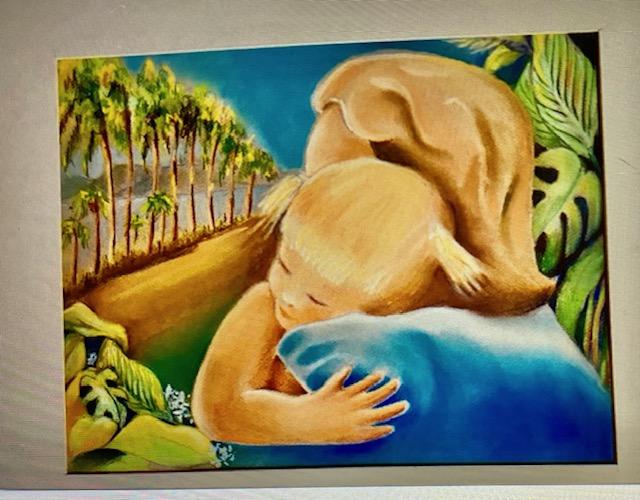Patricia’s Blog
SHELTERING ARMS
By Patricia Wynn Brown

The Empire of Japan occupied the Dutch East Indies (Now Indonesia) during WWII from March 1942 until after the end of the war in September 1945.
This is a painting my friend Irveline Evans created of her mother holding her. She painted this memory from WWII when Irveline and her mother were incarcerated in a Japanese run detention camp in Djakarta. Irveline’s father was one of the slave labor military prisoners working on the “Bridge over the river Kwai.”:
Irveline sent me this picture this morning saying that she wanted to convey how her mother protected her during their war time imprisonment. On Irveline’s couch in her living room now is the teddy bear her mother somehow procured for her during their long detention.
Also, she mentioned the other day when we had tea with our mutual friend Suzanne, (whose mother was in that camp too, but that is a story for another time) that they were surrounded in the camp of mothers and their children by mango trees but were never permitted to eat them. I am fortunate to have met Irveline’s mother a couple times on her visits to Columbus from Holland.
Irveline shows the grit and positive perspective of a survivor. She went on after freed to take ballet classes then to dance in the Royal Dutch Ballet. She was one of my earliest ballet teachers. (She still teaches, now, at the new Upper Arlington Community Center). She has greatly influence and inspired me.
Trauma formed her earliest childhood memories. Her mother endured much abuse and suffering. There were days the women would need to stand an entire day at attention with a slight bow to their captors. If punished, they were forced to dig a whole and bury their meager portion of food. They were starving. They were brutalized.
How does a person recover from such early trauma? I see Irveline, now in her mid 80s, as one of the most positive and vibrant people I know. I believe the arts is one of her key survival assists. Also, she had a mother’s love.
If we are fortunate, we experience many “sheltering mothers” in our lifetimes. We must show gratitude for that.
